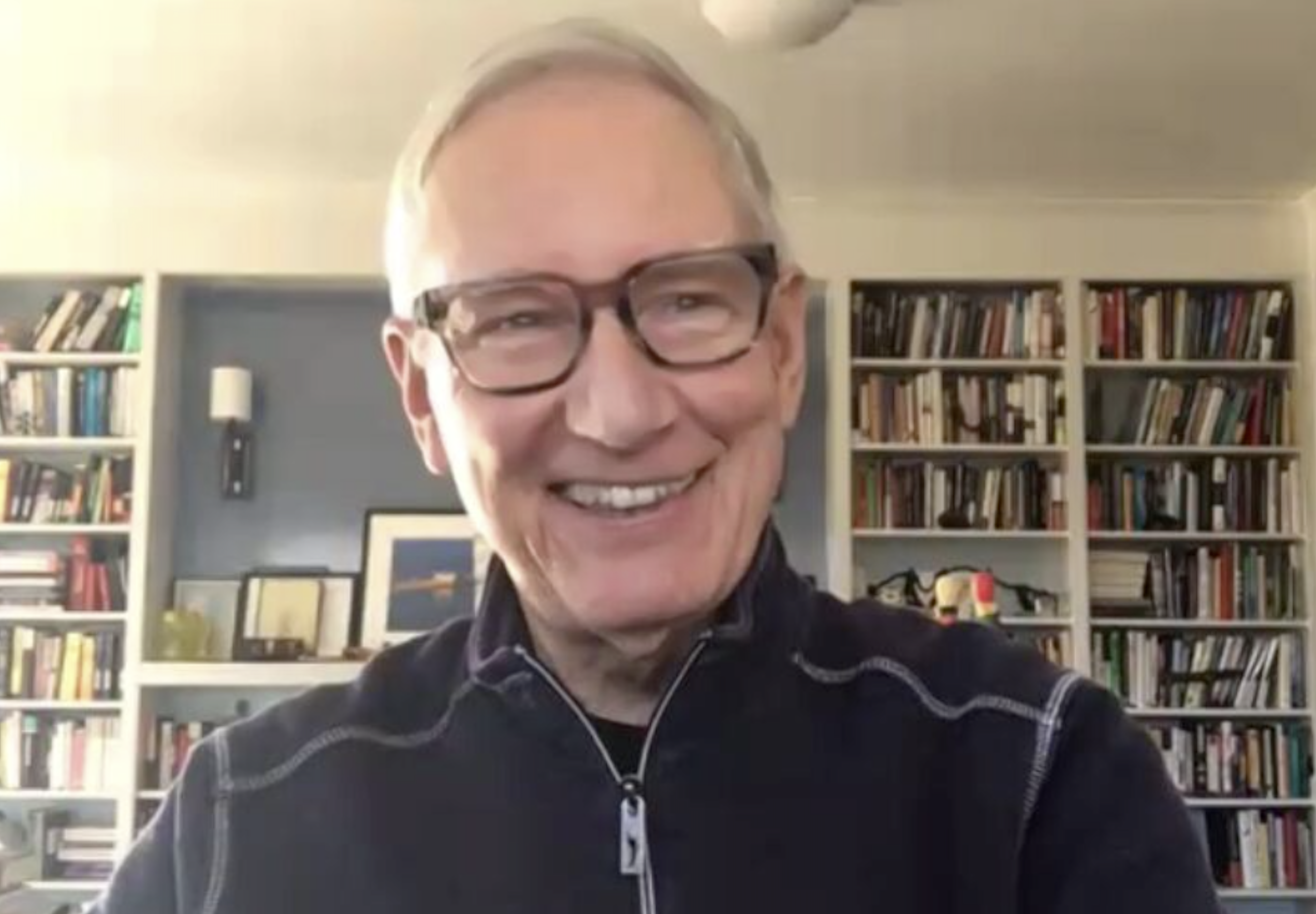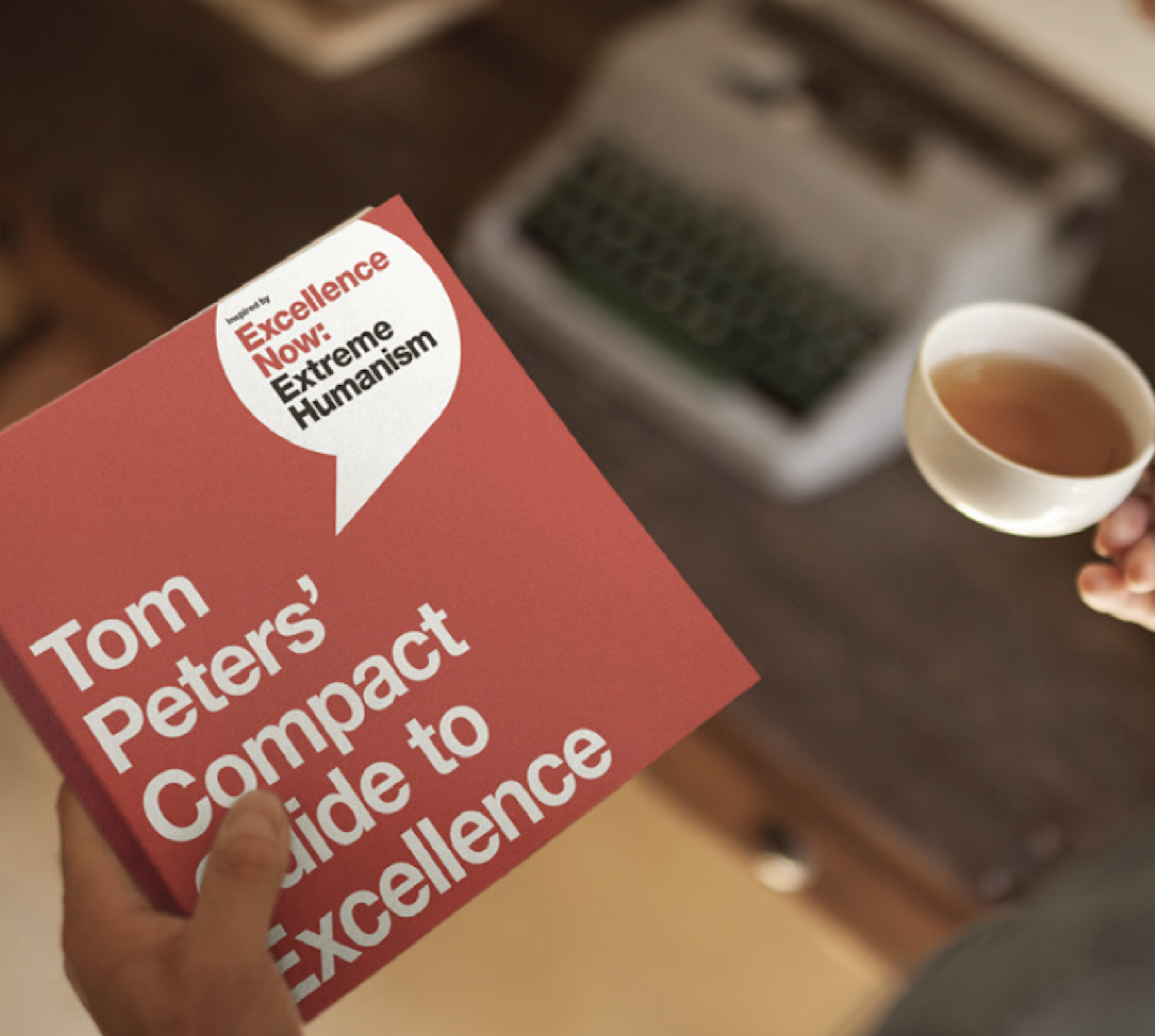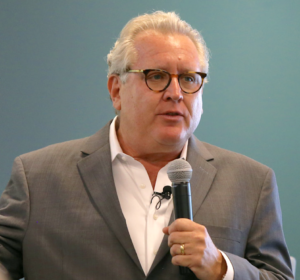
“In order to be effective, you must be desperate — desperate to get your ideas that you care about into the heads of the audience. Desperation fuels excellence.”
That is just a sample of the brilliant and provocative advice I heard during my interview with the legendary Tom Peters, author of In Search of Excellence, and many other classics including his wonderful new book, Compact Guide to Excellence.
Today, you can sit in on this inspiring discussion in two ways. You can click the link below to hear the 30-minute podcast episode, or you can read a transcription in this post. Highlights include:
- Tom’s surprising take on “quiet quitting.”
- “You don’t have to like your employees, but you have to love them.”
- Why “business is community, period.”
- Your job as a leader is to “hire well and promote.”
- Why we need to hire “the quiet ones.”
Please listen to the episode by clicking here or reading the transcript below.
Click to hear Episode 263
Transcribed by AI with some light editing for clarity and brevity:
Mark Schaefer
We’re going to start the new year off with a bang. My special guest today on the Marketing Companion is Tom Peters. I was lucky enough to have Tom on the show about two years ago. And Tom, you told me at the time you were retiring, so what the heck’s going on here man?
Tom Peters
I’ll give you the phone number of my shrink you can call her, and she’ll explain.
Here’s what I think is the real answer, which of course is exactly what we’re going to talk about today.
 The real answer, and I think this is also true for you, is my message is actually not very complex. As you know, I’ve got a whole bunch of business degrees and engineering degrees, but my one-liner has been, you will be able to understand everything I say if you can show me a signed certificate of completion from the fourth grade. It is very straightforward stuff.
The real answer, and I think this is also true for you, is my message is actually not very complex. As you know, I’ve got a whole bunch of business degrees and engineering degrees, but my one-liner has been, you will be able to understand everything I say if you can show me a signed certificate of completion from the fourth grade. It is very straightforward stuff.
And so I remain perpetually irritated at my own incompetence that I haven’t made it stick. One statistic that drives me crazy: Only about 20% of people are engaged in their job. And that’s an awful statistic given what you and I do for a living, I blame the boss 99% for those kinds of things, and you know, we’ve got social instability in our lives these days. And I think if people were connected to their work, that would be a lot less likely to be the case. So you know that that’s my story for not quitting. I don’t expect to change the world. But maybe, thanks to people like you who talk to me, maybe I can pick a few more low-hanging apples off the tree.
Mark Schaefer
I’m delighted that you’re here again, and I’m honored that you reached out to me about your new book. We’ll talk about this book, which was just delightful. It’s brilliantly compiled. And I didn’t want to put any pressure on you, but I just wanted to say that when you were on the show two years ago, it was the number one episode ever. We are now in our 10th year of this show. Some people said they listened to the episode with you. Two or three times.
Tom Peters
Wow. I am literally flattered beyond words.
Mark Schaefer
Well, I’m going to flatter you even more. I have a new book coming out called Belonging to the Brand, and I start the book with you. I also end the book with you. So I want to start our podcast episode with the quote that I start the book with. It says, “There is no business excellence, only community excellence. Think deeply about that.” Let’s start with this quote Tom.
Tom Peters
The most important idea is that businesses aim to serve. Employees, vendors, customers, and the business itself are embedded in a community. The purpose of business is to make the world a better place. The person who said it best, and actually I’ve got her at the beginning of the new book is the late Anita Roddick, the founder of The Body Shop. She said if you ain’t serving the community, then what the hell are you doing in business? And she says it with a sharp British tongue that she used to have.
I don’t know how to answer that question. It should be as obvious as the end of your nose. Business IS the community. It’s not, you know, ‘Let’s do this community thing.’ You ARE the effing community, excuse my old sailor’s language.
Mark Schaefer
I’d love for you to comment on Nancye Green’s design of the book because this book is not only brilliant in its execution, but what Tom has done here is taken quotes from business leaders and authors that he admires and curated them into the book. But the book is the most unusual size. It’s a compact, dense little book, Tom Peter’s Compact Guide to Excellence. And it’s user-friendly because it’s these little snippets of advice. How did you arrive at this concept? It’s a great innovation.

Nancye designed my next to last book, and that book was called Excellence Now: Extreme Humanism. And it looks terrific too. She and I were just talking about ideas. And basically, we said, you know, we can really condense this thing. In the past, for example, I would have one of those quotes, and then there would be 700 words of commentary from me — Which might have been pretty good stuff, but it also dilutes the power of the quote itself. And so we just said, let’s try it. Let’s put this together. And I came up with the stuff that I thought was most important.
I have been yelling and screaming about the power of design. And I think it’s incredibly important. I think it’s the number one differentiator.
Mark Schaefer
I hope people will experience this book because it really is a tour de force, just in design and the feel of the book and the ease of user experience is really quite remarkable.
Now the other thing I want to build on from your first comment is you talked about business as something that makes the world a better place. And I know that is your big theme. But when I grew up in school, it was Milton Friedman banging us over the head about the purpose of the business is to increase stakeholder value. And it wasn’t really till maybe seven or eight years ago, where I just thought, wait a minute, this is just going too far. We’re making the world worse in many ways and there’s got to be more to it than this. That is really one of your major themes in this in this new book.
Tom Peters
No, I’d say it is THE theme of the new book! And I also think you picked exactly the right villain.
And the wonderful, horrible thing about it is that you can quantify it. In September of 1970, Friedman wrote a famous slash infamous article in The New York Times, in which he said in a single sentence that business has no responsibility to anyone other than the shareholders. When he said that, about 50% of profits went to shareholders, executives, etc. and 50% went to people, r&d and so on. And I hope our listeners will listen very carefully to the next sentence. There was a study that replicated it in 2014 and 91% of profits went to share buybacks, shareholders, and executives, and 9% went to the people. This is not a trivial statement because this total distortion is what causes the despair, the anger in our world to a significant degree. We’ve got incredible inequality. I don’t give a damn if you’re right wing or left wing. You can’t deny the inequality, It’s as bad as it has ever been.
And back to community. We all work for enterprises of some sort, and I don’t know what the numbers are, but presumably, 50% of us work for the government and another 5% for nonprofits, and 80% were for businesses, not General Motors, but for the two-person shop, the 20 people shop, as well as the big guys. You made a horrible mistake because this is one of those ‘don’t get me started questions.’ You got an hour dude?
Mark Schaefer
So I need you to help me sort something. As I went through your book, another powerful message is this emphasis on emotional well-being in the workplace. You hit that very, very hard. And I have to say I’m a little conflicted about some of the things I see going on right now.
I read this thing from a Gen Z newsletter, and the person from Gen Z said, we will not be stressed. We just will not be stressed. And if we are stressed, we’re not going to work. So you better create a workplace that’s free of stress.
They’re sort of justifying the quiet quitting thing. If I look back at my career, a lot of my personal growth came through the stress that came from things going wrong. So tell me more about your perspective on emotional well-being in the workplace. Certainly, that is a dynamic, important issue today.
Tom Peters
There is stress … and then there is stress. My whole point, and I think it’s your whole point, is respect and care and thoughtfulness for people. And then we can handle stress, which is the same thing at work or home. You know, you’ve got stress because your 17-year-old acted up, but the base that makes it work is that he knows that you love him. The toughest SOB on the football field in my lifetime is the old Green Bay Packers coach, Vince Lombardi. I wish I could give you all five lines, but the first two lines of this Lombardi quote and I hope everybody here will listen: You do not need to like all of your players, but you must love them. Vince Lombardi was a tough son of a bitch. You know, he could have beaten the crap out of you and I with both of his hands tied behind his back. But he said, the whole business of a winning team is you support one another. You know, when you’re having a bad day because your father had a heart attack. I’m trying a little bit harder as the guard who’s next to the tackle to defend. So the stress is normal, and the stress is fine.
And it’s you know, do I really care about these people? You know, and incidentally, I don’t lay that trip on the Gen Z ers. I will land that trip on the bosses who have never gotten the damn thing right. And I will also say that this can happen as effectively in a Starbucks or McDonald’s as it can at Google or Hewlett-Packard.
But, you know, the stress thing is in the sense of your time as a cop out. My whole goal today, in this new world and the old world as an employer is to keep you and help you. That’s all I want in life. That’s my thing. Unless you were born with a silver spoon in your mouth, you are going to spend more conscious of waking hours at work than anything else. It’s an absolute phony baloney comment. As I said, I’m not blaming it on Gen Z. I’m blaming it on the boss. The boss should have been doing this shit 20 years ago.
Mark Schaefer
So there was one statement in your new book that just stopped me in my tracks. It made me think more than maybe any of the other comments in there. And I again have to reflect on what it means for me. “Hire the quiet ones. Tell us a little bit about what you’re thinking there. Hire the quiet ones …
Tom Peters
The century is 23 years old. By my rights the best business leadership and management book, this century has come from a woman named Susan Cain. And the title of the book is Quiet. And I met Susan one time, and I said I know the purpose of your book it was to call me a jerk. And what she says is basically with a lot of research, is the noisy people are thought to be more physically attractive. They’re thought to be more intelligent, and seven other variables. And yet the real research says just the opposite.
If you have a brainstorming group, or brainstorming whatever, with five groups, I really love this one, and it said the extrovert groups in an hour will come up with 217 ideas. The introvert group, the quiet ones, will come up with four ideas, but they will have discussed them in-depth, and a couple of them are likely to be real winners. I read the book and I had a speech to the leadership of a couple billion dollar electronics parts company. And I said you guys are paying me a lot of money. And so I don’t think this is a great way to start, but I’m going to do it anyway. I said, you’re like me, you’re a bunch of idiots. We ignore and downplay half the population. And not only is that stupid in general but it is stupid from a business and a P&L standpoint. When I met Susan, I used Navy language rather than what I used a couple of minutes ago. I felt incredibly guilty about this dimension … You know, the noisy ones are the smart ones. The noisy ones are the clever ones and the noisy ones are the pretty ones. And it’s bullshit. There are a lot of noisy people who are fantastic. That’s not the argument. But we’re overlooking half the workforce.
Mark Schaefer
Well, it’s funny, after we talked a couple of years ago, during the interview I just thought what makes Tom so special in a discussion like this, what makes him so powerful? And the word “bold” came to mind. I wrote a whole blog post about it. I use it in my teaching when I talk about personal branding. To me, bold means telling the truth with courage. And that certainly comes through today and that’s probably why people admire you so much. So you came up with this book as another way to get your ideas out there. So what’s your psychiatrist say? What’s next?
Tom Peters
I’m not bold. I’m pissed off.
These are not insignificant ideas but they’re not complex. I use Twitter a lot and somebody said, you know, I’m gonna give you the 27 things you should do to be a good public speaker. And I said, I don’t disagree that you can do that. But in order to be an effective speaker, you must be desperate, desperate to get your ideas that you care about into the heads of the audience. Desperation fuels excellence. I don’t WANT to get my message across. I HAVE to get my message across. And I think that’s the great differentiator whether you are a preacher standing in a pulpit, or if you are Vince Lombardi.
I don’t want to do this damn stuff. Hell. I just had my 80th birthday, give me a break. But it’s the effing audience that won’t do it. So I have to keep coming back to your damn show every couple of years.
Mark Schaefer
Well, that’s good. As long as you’re pissed off, I’m happy to have you on my show. So it’s funny, Tom because someone asked me a while ago, you’ve written ten books. Why do you do this? How do you get these ideas?
There’s been a general theme in my books — the subtitle of Marketing Rebellion was the most human company wins. And I said, I just have these ideas that I have to get out. And I never used the word desperate before, but maybe it’s becoming that way.
And so what I’d like to do is to sort of wind up our time together on what I think is a wonderful, beautiful note. I’d like to read for you how I end my new book, the last words in the book.
Not long ago, I interviewed the famed author of In Search of Excellence, Tom Peters. Tom has been one of the most influential business writers and strategists for more than 40 years, and my podcast recording was near the end of his retirement tour. I asked him, “What would be your final, most important advice for the thousands of marketing professionals listening to this podcast?”
He paused for a moment and said, “When you come home at night, are you proud of what you did that day? Are you proud to tell your family about what you are doing in your marketing job?”
I thought that was such unexpected and poignant advice. His words were always in my mind as I wrote this book because committing our careers to a purpose-driven brand community is certainly something we could be proud of every day.
Yes, community-based marketing can help our companies and perhaps even inspire our customers. But community is also a way to make us proud of our life as marketers. Wouldn’t it be an amazing legacy to create the “most belonging” company in the world?
… So that’s the impact you had on me.
Tom Peters
Well, I deeply appreciate it. If you can’t brag to your spouse and you can’t brag to your kids, what are you doing?
Mark Schaefer
Just in case this would be your actual retirement, but I doubt it, what would you leave our listeners with today around your book and your message… specifically to the marketing profession? You know, I might need to end another book someday.
Tom Peters
There was a three-star general by the name of Melvin Zaice — very successful. He gave a speech at the Army War College, to mid-level officers which would mean majors, lieutenants, Colonels, and so on,
And he said I want to end with one thing. And the one thing that will make you more effective, more of a human being: you must care. You must care. He said, You’re the captain of a company. And he said you’ve got inspection coming up tomorrow. You go over to the barracks. He said, You don’t have to open your mouth. You sit on somebody’s bed. They know that you know how hard they are working to make you look good. So that’s my final point.
You must care. You’ve said it. I’ve said it. Business is a human affair. And the wonderful thing for our accountants is if you get this stuff right, you’ll observe that your bank account is growing faster.
![]()
This conversation is sponsored by The Creator Economy Expo (CEX)
CEX May 1-3, 2023 is the must-attend experience for content creators interested in building and growing their content-first businesses without relying on social platforms. Join 500+ bloggers, podcasters, authors, newsletter writers, speakers, coaches and consultants, freelancers, and YouTubers at THE learning and networking event for content creators. To get $100 off your ticket, please use the code SCHAEFER100.
 Mark Schaefer is the executive director of Schaefer Marketing Solutions. He is the author of some of the world’s bestselling digital marketing books and is an acclaimed keynote speaker, college educator, and business consultant. The Marketing Companion podcast is among the top business podcasts in the world. Contact Mark to have him speak at your company event or conference soon.
Mark Schaefer is the executive director of Schaefer Marketing Solutions. He is the author of some of the world’s bestselling digital marketing books and is an acclaimed keynote speaker, college educator, and business consultant. The Marketing Companion podcast is among the top business podcasts in the world. Contact Mark to have him speak at your company event or conference soon.


